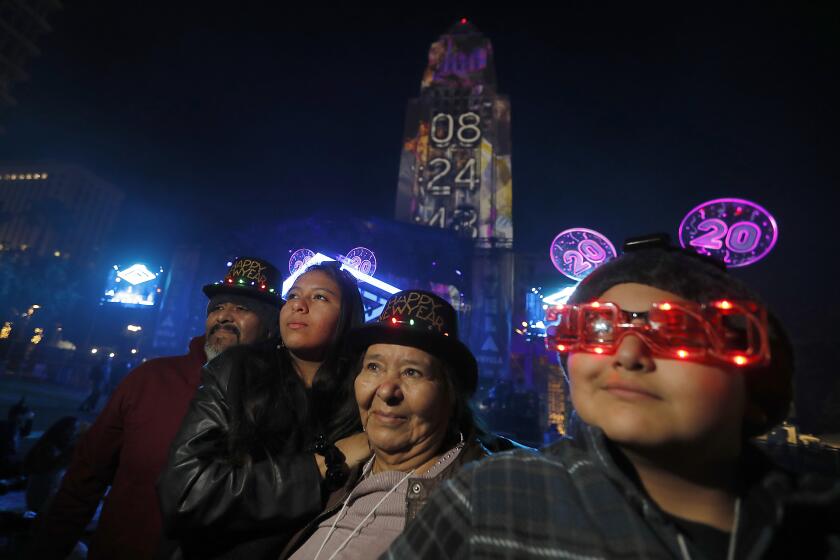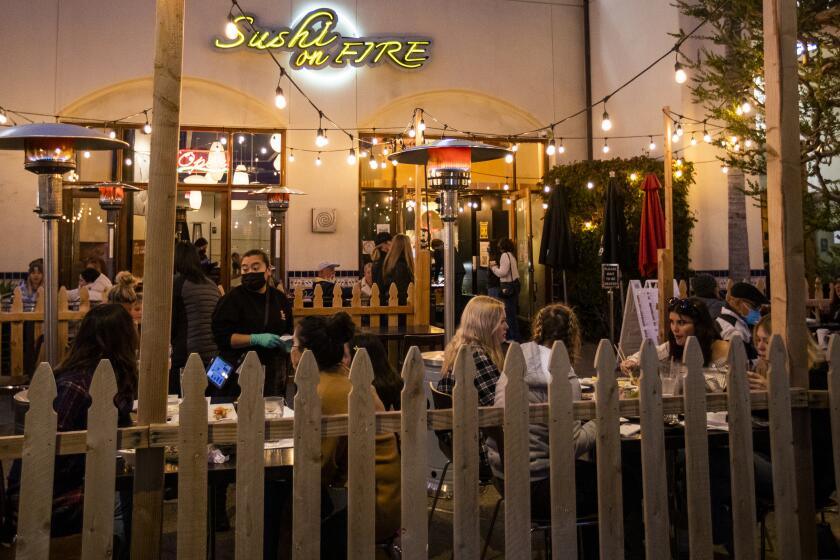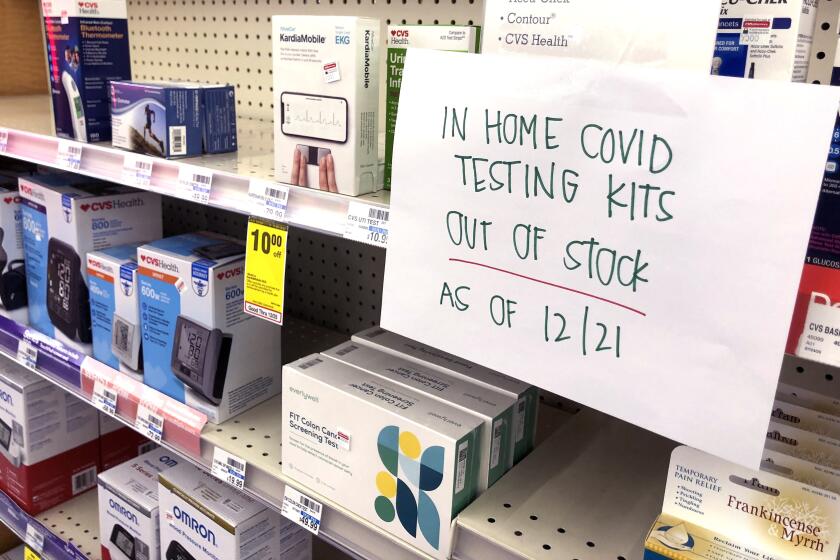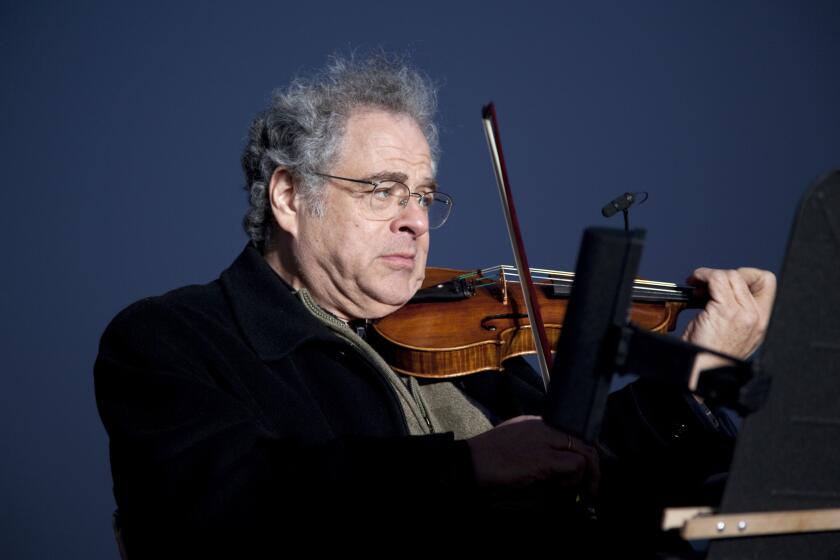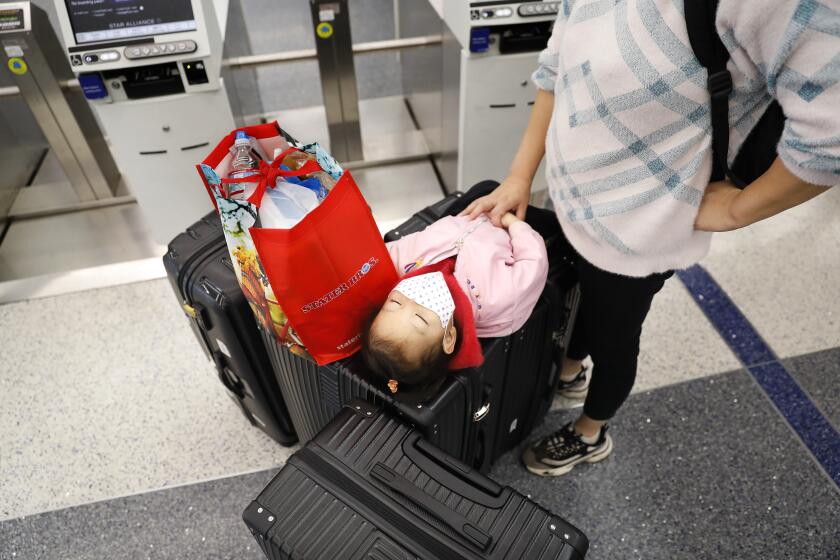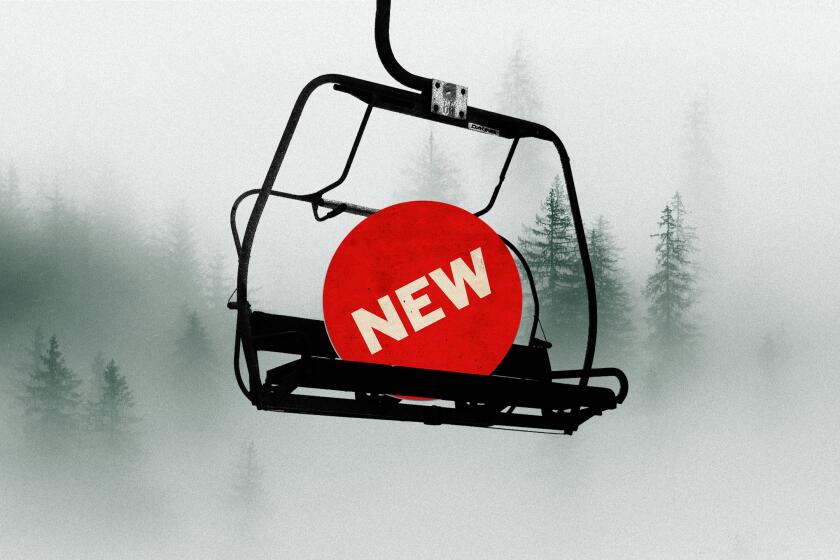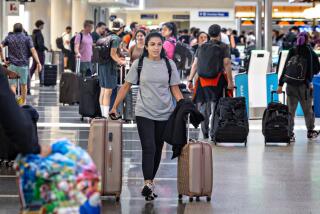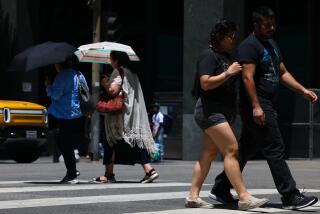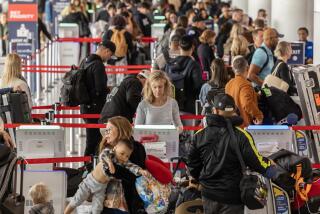New Yearâs parties? Indoor dining? Skiing? Which activities are safe as Omicron spreads
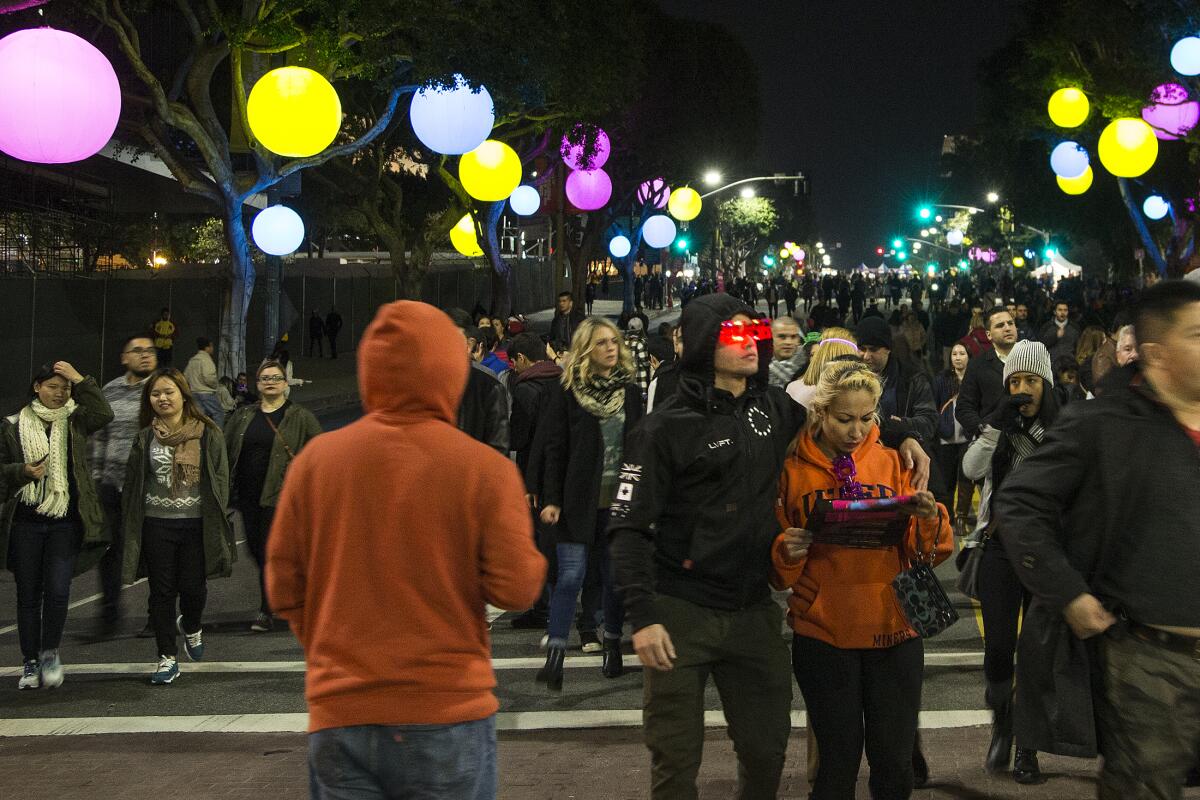
A sharp spike in coronavirus cases, in part fueled by the new Omicron variant, is prompting health experts to urge that New Yearâs Eve gatherings be toned down.
Revelers can still hold indoor parties, but they would be safer if smaller, with guests who have been fully vaccinated and gotten a booster shot, officials say.
Larger gatherings can be held more safely outdoors, but people should still mask up in crowded settings, regardless of whether they are inside or out.
A growing number of holiday events in Los Angeles County have been canceled or postponed amid a rash of new coronavirus cases.
Here are some tips for staying safe for the holiday from health experts and officials:
Avoid dining at indoor restaurants
A week ago, Dr. Peter Chin-Hong, a UC San Francisco infectious diseases expert, said that as a healthy, vaccinated person whoâs received a booster shot, heâd feel fine dining at an indoor restaurant.
But soaring case rates have changed his mind, and Chin-Hong said Tuesday that he wouldnât eat at an indoor restaurant right now.
He said heâs not worried about being hospitalized with a breakthrough infection or dying from COVID-19, but Chin-Hong doesnât want to risk being sidelined from work during a busy time at his hospital.
âIf Iâm not there, then somebody else has to do my work,â he said.
Dr. Sara Cody, the public health director and health officer for Santa Clara County, also suggested avoiding indoor restaurant dining. The daily coronavirus case rate has tripled in Santa Clara County â Northern Californiaâs most populous county â in the last week.
âI would recommend patronizing your favorite restaurant by ordering takeout or delivery; by tipping a lot if youâre able to support them. But gathering indoors without a mask is not the safest way to be right now, with Omicron spiking as it is,â Cody said Tuesday.
She recommended that restaurants and bars require customers to be up-to-date on their vaccinations.
Itâll be safer to eat at restaurants where everyone is required to show proof of vaccination, as is the case in cities like Los Angeles, West Hollywood, San Francisco and Berkeley, said Dr. Robert Kim-Farley, a medical epidemiologist and infectious diseases expert at the UCLA Fielding School of Public Health.
Kim-Farley, 73, said heâs stopped dining at indoor restaurants in light of the Omicron surge. Healthy young people in their 20s or 30s who are vaccinated and boosted could dine indoors in places that arenât crowded without being as concerned about the chance of severe illness or death, he said. But they should be aware there is an increased risk of breakthrough infections with Omicron compared with the Delta variant, and an infection could be contagious, he warned.
They also should consider whether they live with older parents or grandparents, who would be at greater risk if the virus is transmitted to them.
Unvaccinated people shouldnât be going to indoor restaurants; the risk of infection is just too high, Kim-Farley said.
âItâs going to ultimately come down to peopleâs own risk tolerance of what they wish to do,â he said.
The risk of contracting the coronavirus while dining indoors at restaurants is one reason why L.A. County is requiring that those eating together live in the same household.
Consider outdoor dining instead
Chin-Hong said heâs confident about the safety of outdoor dining: âIâm not afraid of the outdoors at all.â
Have a smaller New Yearâs Eve party
Cody said she wouldnât recommend New Yearâs Eve celebrations unless they are small.
âSmall intimate gatherings is the way to go this New Yearâs. Itâs not the time to go to a large gathering,â she said. âThe only exception would be if youâre going to spend the entire gathering outdoors, and if youâve got great cold-weather gear ... enjoy a New Yearâs outside.
âBut at this point, it simply is not safe to gather with large groups of people indoors, particularly if people will be removing their masks,â Cody said.
Cody suggested if you do gather indoors â even in your home â with more than 10 people from outside your household visiting, âwe really urge you to keep your masks on.â
Kim-Farley also advised against crowded New Yearâs Eve gatherings indoors, especially where people might be singing and dancing in close quarters.
Watching fireworks outdoors would be a safer activity, but he suggested people still wear masks in crowded outdoor settings.
Dr. Anthony Fauci, the White Houseâs top medical advisor, advised against large gatherings.
âIf your plans are to go to a 40 to 50 person New Yearâs Eve party with all the bells and whistles and everybody hugging and kissing and wishing each other a happy New Year, I would strongly recommend that this year, we do not do that,â Fauci said. âWe feel you should continue to go through with those plans of having a home-related, vaccinated, boosted gathering, with family and close friends who are also vaccinated and boosted.â
Demand for rapid at-home COVID-19 tests is so high, pharmacies are rationing
Get a rapid test before a gathering
Attendees at gatherings should take a rapid coronavirus test as soon as possible before an event.
âTesting supports early detection and reduces an individualâs likelihood of unknowingly spreading the disease,â said Dr. Regina Chinsio-Kwong, a deputy health officer for Orange County.
Even for a modest gathering, Chin-Hong said heâd prefer having everyone tested beforehand.
âIt just seems that I could have a better proxy of peopleâs infectiousness by doing a rapid test, if I can get them,â Chin-Hong said.
Itâs important to take a rapid test just before the event begins. Getting a PCR test that requires a nasal or saliva swab sample to be sent to a lab, with results coming back in a day or two, will produce results that are too old to be useful. A person might not have been infectious when they had the sample taken but could be contagious a day or two later, when the event has started.
âIf I had a group of 10 indoors, and everybody got rapid tested, and everybody was boosted, Iâd feel very comfortable, not even necessarily having a mask on,â Chin-Hong said.
Under that scenario, he said even if a child younger than 5 who was too young to be vaccinated was present, heâd feel comfortable. But if there were multiple unvaccinated children from multiple households, âIâd probably feel worried about it.â
If hosting an indoor gathering, opening windows and obtaining HEPA air filters can further reduce risk, experts say.
And if youâre unable to get rapid tests and decide to proceed with a party, people can get tested three days after the event.
The Producers Guild Awards have been postponed because of Omicron, joining the Grammys and myriad events that have been axed or delayed.
Scaled-back New Yearâs Eve events
The New Yearâs Eve countdown celebration in downtown L.A.âs Grand Park has transitioned to streaming-only after park officials said it was too risky to congregate in person. The event will be broadcast, with a countdown clock projected on City Hall.
A fireworks show is still planned for the Long Beach waterfront at midnight, and local merchants are suggesting that people make reservations at downtown restaurants for a view of the show.
But San Francisco nixed its New Yearâs Eve fireworks show along the Embarcadero. âBy canceling the New Yearâs Eve fireworks show, we are reducing everyoneâs exposure to COVID-19 while ensuring continuity of citywide public safety operations,â Mayor London Breed said in a statement.
The Rose Parade, however, is scheduled to return. âAll the planning that we have done has positioned us well to be able to host the Rose Parade in a safe and healthy way,â said David Eads, executive director of the Tournament of Roses.
The Tournament of Roses is requiring the 6,000-plus parade participants, including people on floats, marching bands and equestrians, to provide proof of vaccination or a negative COVID-19 test within 72 hours of the event.
As of Monday, just over 90% had given proof of vaccination, Eads said.
Parade spectators ages 12 and up in ticketed areas, like grandstands, will also have to provide proof of vaccination or a negative test within 72 hours. Ticket holders ages 18 and up will have to provide photo identification, and all attendees ages 2 and up in those areas will be required to wear a mask.
Along the rest of the 5.5-mile route, where people can just walk up and watch, vaccination and negative test results will not be checked.
Dozens of flights were scrapped Monday at LAX, and hundreds were canceled nationally after a weekend of holiday travel woes.
Flights, vacations and conventions
Kim-Farley suggested that people rethink vacations, such as a getaway trip to Hawaii, given the amount of coronavirus circulating. While transmission is probably not particularly likely on the flight itself, there is risk during other parts of travel.
âIf you had an essential trip that you felt was important, yes. But if youâve got something thatâs nonessential, it just may be wise to wait a month or two â because we will see this peak and we will see it go back down again,â Kim-Farley said.
People who test positive at, say, a resort in Hawaii would have isolate there, potentially extending their stay.
As for conventions, organizers can make them safer, by spacing out attendees, requiring masking and proof of vaccination, and improving ventilation, as was done for a recent meeting for public health experts in Colorado. Organizers also can make virtual attendance an option.
âIt doesnât mean that [the meeting is] totally safe, and people are going to have to make those decisions,â Kim-Farley said.
Winter resorts in the West have rolled out new features for skiers and snowboarders.
Skiing/snowboarding
Skiing and snowboarding are quite safe; they are outdoors activities, and many participants wear masks.
The risk is going into crowded indoor areas, such as lodges or restaurants, to eat. It would be safer to grab some food and eat outdoors, Kim-Farley said.
Times staff writers Hayley Smith, Hailey Branson-Potts, Jonah Valdez, Anumita Kaur, Lila Seidman and Hugo MartĂn contributed to this report.
More to Read
Sign up for Essential California
The most important California stories and recommendations in your inbox every morning.
You may occasionally receive promotional content from the Los Angeles Times.
